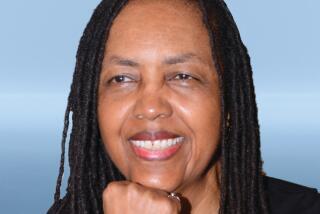Letters: A slave and a black president
- Share via
Re “The slave link,” Opinion, Aug. 8
Declaring President Obama a direct descendant of the first black American slave is an example of how history can be manufactured to satisfy contemporary excitement.
John Punch was not the first legally defined slave in American history, as Erin Aubry Kaplan and others have declared. Massachusetts, not Virginia, was the first colony to legally recognize slavery. It legalized slavery in 1641, thus creating the first legal slaves in American history, while Virginia did not do so until 1662.
Furthermore, the attachment of lifetime servitude as punishment to Punch did not make him a slave. Slavery is a legal condition created by the actions of a constituted government.
By distorting facts, we obscure the accurate dynamics of slave history, missing yet another opportunity for real education that could benefit a 21st century generation.
Holly Roose
Santa Barbara
Darrell Millner
Portland
Roose is a doctoral student in history at UC Santa Barbara; Millner is a professor of black studies at Portland State University.
Kaplan seems enthralled with the recent genealogical discovery that Obama’s 11th great-grandfather in his mother’s line was a black slave. Obama, according to Kaplan, is “more black than we imagined.”
As an amateur genealogist, I can attest to a certain exhilaration in discovering an 11th great-grandfather or two in the 17th century. But one must put this into perspective. Progressing each generation from Obama’s white grandparents puts the putative Obama ancestor Punch in a not-too-select group of more than 4,000. With numbers like these, I may even be related to Kaplan.
Statistics aside, Kaplan finds Obama’s newfound ancestry “inspiring.” Rather than sharing Kaplan’s enthusiasm, I am reminded of the ardent segregationist charge of “one drop of black blood,” something Kaplan would no doubt find meaningless and vicious.
Dave Koegel
Long Beach
As a middle-aged non-African American man, the revelation of Obama’s genealogical connection to Punch gave me no unease at all. On the contrary, I found it fascinating, and I marveled at the science that makes such linkage possible. Then I moved on.
Kaplan is a noted commentator on African American history and culture and can certainly claim that this revelation “raises issues that are bound to make Americans of all political stripes uneasy,” even though it apparently hasn’t. By doing so, she is making the same generalizations about millions of people like me that if reversed she would probably rail against.
Time to move on.
Eugene Sison
San Dimas
ALSO:
Letters: What the postal service needs
Letters: Olympic medalists shouldn’t pay
More to Read
A cure for the common opinion
Get thought-provoking perspectives with our weekly newsletter.
You may occasionally receive promotional content from the Los Angeles Times.










